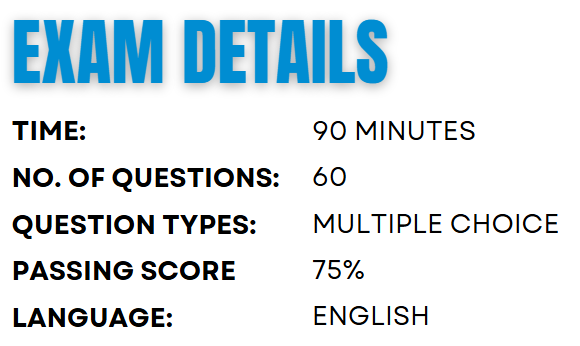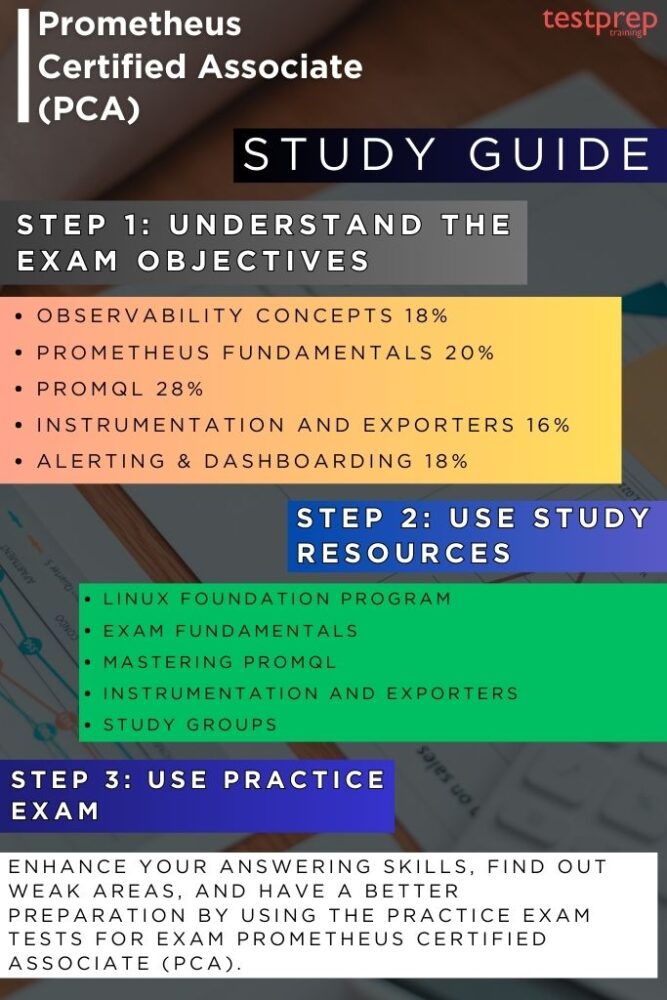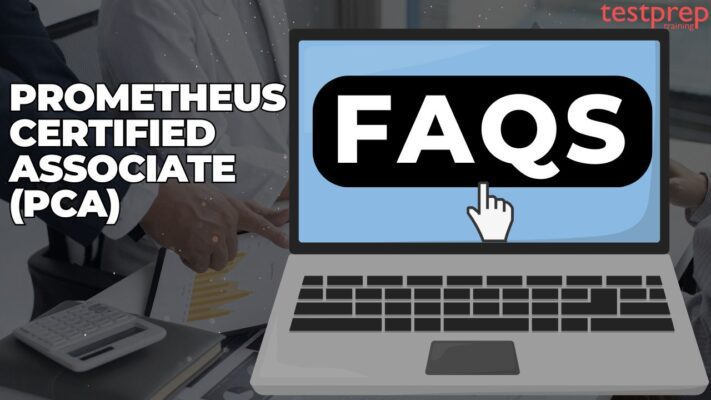Prometheus Certified Associate (PCA)

The Prometheus Certified Associate (PCA) exam validates an engineer’s fundamental understanding of observability concepts and proficiency with Prometheus, the open-source toolset for system monitoring and alerting. Achieving PCA certification confirms a candidate’s expertise in gathering and processing observability data within an application stack, regardless of whether it’s cloud-native. The exam is designed to equip candidates with the core skills needed to manage data monitoring, metrics, alerts, and dashboards using Prometheus.
Knowledge Area
The PCA exam showcases a candidate’s knowledge of best practices for monitoring cloud-native applications and infrastructure with Prometheus. Earning the PCA digital credential confirms the candidate’s ability to leverage observability data to optimize application performance, diagnose system issues, and integrate this data with other systems.
Target Audience
The PCA is an entry-level certification aimed at engineers or application developers with a focus on observability and monitoring. Ideal candidates are those who have earned Kubernetes certifications like KCNA, CKA, or CKAD, or have participated in Prometheus-specific courses or Cloud Engineer bootcamps.
Exam Details

The Prometheus Certified Associate (PCA) exam is an online, proctored multiple-choice assessment designed for beginners. The certification is valid for two years and includes a 12-month exam eligibility period, with one opportunity for a retake. The exam consists of 60 multiple-choice questions, which must be completed within 90 minutes. It is delivered online and proctored remotely through streaming audio, video, and screen sharing. Results will be emailed to candidates within 24 hours of completing the exam. To pass, candidates must achieve a score of 75% or higher. Please note, the exam is available exclusively in English.
Course Outline
To effectively prepare for the Prometheus Certified Associate (PCA) exam, focus on the following key topics:
1. Observability Concepts 18%
- Metrics
- Understand logs and events
- Tracing and Spans
- Push vs Pull
- Service Discovery
- Basics of SLOs, SLAs, and SLIs
2. Prometheus Fundamentals 20%
- System Architecture
- Configuration and Scraping
- Understanding Prometheus Limitations
- Data Model and Labels
- Exposition Format
3. PromQL 28%
- Selecting Data
- Rates and Derivatives
- Aggregating over time
- Aggregating over dimensions
- Binary operators
- Histograms
- Timestamp Metrics
4. Instrumentation and Exporters 16%
- Client Libraries
- Instrumentation
- Exporters
- Structuring and naming metrics
5. Alerting & Dashboarding 18%
- Dashboarding basics
- Configuring Alerting rules
- Understand and Use Alertmanager
- Alerting basics (when, what, and why)
Prometheus Certified Associate (PCA) Exam FAQs
Exam System Requirements
Candidates are advised to run the PSI Online Proctoring System Check to ensure their device meets the technical requirements for taking a proctored exam.
The online proctored exam is conducted via PSI’s “Bridge” platform, using the PSI Secure Browser—a specially designed web browser that ensures secure exam delivery over a virtual connection.
The secure browser will begin downloading and installing when you select “Launch exam” from the PSI Dashboard.
Candidates are required to use their own computer with the following specifications:
- Supported Operating System: Please refer to PSI’s published System Requirements, specifically the list of supported Operating Systems.
- Browsers: While all browsers are supported, PSI recommends using the latest version of Google Chrome for the best scheduling experience, as the secure browser is Chrome-based and ensures a more seamless experience.
- Display: One active monitor, whether built-in or external, is required.
For more information, check here.
Prometheus Certified Associate (PCA) Exam Study Guide

1. Understand The Linux Foundation Certification Program
The Linux Foundation, established in 2007, is a non-profit organization committed to advancing the Linux ecosystem. It supports the work of Linux creator Linus Torvalds and collaborates with leading Linux and open-source companies and developers worldwide. In partnership with open-source project communities, the foundation offers globally recognized, practical certifications tailored for technology professionals.
What sets The Linux Foundation apart is its deep integration with cutting-edge technologies. Beyond providing certifications for in-demand skills, it actively hosts and nurtures the projects driving these innovations. By offering resources and staffing, the foundation ensures these development communities remain vibrant and sustainable. No organization is more closely connected to these technologies than The Linux Foundation.
2. Grasping the Fundamentals
A solid understanding of the core concepts of observability and Prometheus is crucial for success in the PCA exam. This involves covers the principles of metrics, logs, and traces, as well as the importance of monitoring system health and performance. Additionally, grasping the concept of SLIs, SLAs, and SLOs is essential for effective monitoring and incident response.
For Prometheus specifically, it’s important to familiarize oneself with its architecture, components, and data model. Understanding how Prometheus stores and retrieves time series data, as well as the role of labels, metrics, and annotations, is fundamental to effective query and analysis.
3. Mastering PromQL
PromQL, the powerful query language for Prometheus, is a cornerstone of effective Prometheus usage. To excel in the PCA exam, it’s essential to master its syntax, operators, and functions. Practice querying Prometheus for specific metrics and time ranges, understanding the distinction between instant and range queries. Getting into advanced PromQL functions like rate, increase, irate, and delta is crucial for in-depth analysis. Additionally, mastering aggregation operators like sum, min, max, and avg is necessary for deriving meaningful insights from large datasets.
4. Learn About Instrumentation and Exporters
Effective monitoring hinges on proper instrumentation and the use of suitable exporters. Understanding the different types of metrics—counter, gauge, histogram, and summary—is key to capturing relevant data. Learning how to instrument applications to expose these metrics enables Prometheus to collect and analyze valuable performance information. Furthermore, familiarity with popular exporters like Node Exporter, Blackbox Exporter, and Prometheus exporter is essential. Knowing how to configure and deploy these exporters ensures that critical system components are monitored comprehensively.
5. Understand Alerting and Dashboarding
Alerting and dashboarding are indispensable tools for proactive monitoring and effective incident response. Mastering the creation of effective alerts using Alertmanager is crucial for timely notifications of critical issues. Understanding alert routing, silencing, and creating robust alert rules is essential for efficient incident management. Additionally, the ability to create informative and visually appealing dashboards using Grafana is vital for gaining actionable insights from Prometheus data. Proficiency in designing dashboards with various visualizations, such as graphs, tables, and histograms, empowers users to make data-driven decisions and optimize system performance.
6. Join Study Groups
Joining a study group can significantly enhance your learning experience and boost your chances of success. By collaborating with peers, you can clarify doubts, discuss complex concepts, and gain different perspectives. Study groups provide a supportive environment where you can motivate each other, share effective study techniques, and practice problem-solving together. Additionally, studying with others can make the learning process more enjoyable and less daunting.
7. Take Practice Exams
Taking practice exams is an effective way to assess your knowledge and identify areas where you need further improvement. Practice exams simulate the actual exam environment, helping you manage time effectively and build exam-taking confidence. By analyzing your performance on practice exams, you can pinpoint your strengths and weaknesses and tailor your study plan accordingly. Additionally, practice exams can help you become familiar with the exam format, question types, and the level of difficulty, reducing anxiety and increasing your chances of success.



